MercoPress. South Atlantic News Agency
Tag: Brazil's Central Bank Monetary Policy Committee (Copom)
-
Thursday, March 3rd 2016 - 05:03 UTC
Brazil leaves key interest rate unchanged at 14.25% for the fifth time running
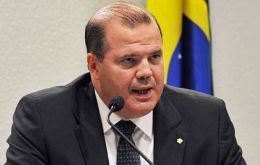
Brazil's central bank kept interest rates on hold on Wednesday as widely expected, opting to avoid inflicting more harm on an economy mired in its worst recession in decades despite a surge in inflation. In a split vote, the bank's monetary policy committee, Copom, kept its benchmark Selic rate at 14.25% for the fifth straight time.
-
Thursday, January 21st 2016 - 07:13 UTC
In a surprise move, Brazil's central bank leaves interest rate unchanged at 14.25%
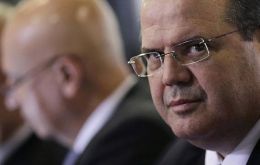
Recession-hit Brazil's central bank in a divided vote left the key interest rate untouched on Wednesday despite rising inflation, opting against an increase that could put a further brake on the world's seventh-biggest economy.
-
Thursday, November 26th 2015 - 16:57 UTC
In a split vote, Brazil's central bank leaves Selic rate unchanged; pressure for an increase
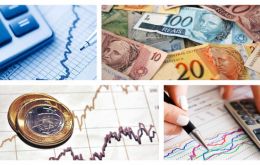
Brazil's central bank kept interest rates on hold for the third straight meeting on Wednesday in a split vote that shows policymakers are uneasy about inflation, a worsening recession which might lead to a raise in rates early in 2016.
-
Thursday, October 22nd 2015 - 07:09 UTC
Brazil leaves Selic rate unchanged at 14.25%; inflation the target but with no timetable
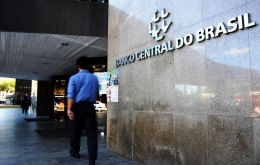
Brazil's central bank kept interest rates on hold on Wednesday, for a second straight month despite a jump in inflation expectations. The decision not to raise rates will give a breather to President Dilma Rousseff, who is fighting for her political survival amid the country's worst economic and political crisis in 25 years.
-
Thursday, September 3rd 2015 - 10:29 UTC
Brazil's central bank leaves basic interest rate unchanged at 14.25%
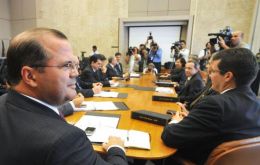
Brazil's central bank halted one of the world's boldest rate-hiking cycles on Wednesday, taking pressure off an economy struggling with recession even amid concerns that a looming budget crisis could stoke inflation.
-
Thursday, June 4th 2015 - 08:54 UTC
Despite a contracting economy Brazil increases basic interest rate to 13.75%

Brazil raised interest rates to the highest levels in more than six years on Wednesday, extending a tightening campaign and leaving the door open for more hikes despite concerns that steep borrowing costs could deepen an expected economic recession.
-
Thursday, April 30th 2015 - 07:52 UTC
Brazil raises basic rate 50 points to 13.25%, highest since December 2008

As was anticipated and in line with the current anti-inflation policy, Brazil's central bank on Wednesday evening announced the increase of the basic Selic interest rate another 50 points to 13.25% from 12.75%. The decision from the nine-member Monetary Committee was unanimous, according to the official release.
-
Thursday, March 5th 2015 - 08:17 UTC
Brazil raises benchmark interest to 12.75%, highest level since 2009

Brazil’s central bank raised its benchmark interest rate to 12.75% Wednesday, the highest level since 2009, as it struggles to get price increases under control amid sluggish economic growth and deepening political turmoil.
-
Thursday, January 22nd 2015 - 06:39 UTC
Brazil central bank increases basic rate to 12,25%, highest since August 2011

Brazil's central bank raised interest rates to a more than three-year high on Wednesday, maintaining an aggressive pace of monetary tightening to contain high inflation, help the economy back on its tracks and win investors disillusioned with the once-booming economy.
-
Wednesday, December 17th 2014 - 00:53 UTC
Brazil's real sinks against US dollar to lowest rate in 10 years

The currency closed at R$ 2.76 per US$ 1 dollar. Domestic politics, international oil prices, US Fed measures and Russian ruble drop to blame.
